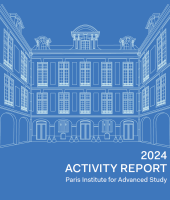Annual Report 2024
The Paris IAS is pleased to share its annual report for 2024.
Forword by the director
Since 2018, the Paris IAS has been transitioning toward a more open, collaborative model that is in tune with current issues and serves all areas of research. In 2024, this transformation has borne fruit: the Institute is now a benchmark for similar institutions.
Beyond the European FIAS program, organized by the French Network of Institutes for Advanced Study (RFIEA), its hosting program has been enriched and diversified. Thanks to the support of partners such as Sorbonne University, Paris Cité University, and the National Bank of Sweden, the Institute has developed thematic chairs, mechanisms to promote the circulation of young researchers throughout Europe, and a large-scale program on societal transition that is among the most advanced in the world in its use of artificial intelligence: the Food Socioscope. Conducted in partnership with the Vienna Complexity Science Hub and funded by the Nomis Foundation, the latter studies the transition to sustainable development on a large scale, based on more than 600 case studies.
Since the end of 2024, the Paris IAS has been a contributor to four of the six major national consortia in the humanities and social sciences selected by the ANR: HERMES, SPHINX, DECRIPT, and RELIGIS. It is also a partner in the artificial intelligence cluster PostGenAI@Paris led by Sorbonne University.
The Institute has supported two former American residents in preparing ERC Advanced projects: one was awarded funding in 2024, the other in 2025. All these programs illustrate the growing interest of French and European organizations in the Paris IAS’s exceptional ability to attract the world’s best researchers and host truly advanced research. This interest is also reflected in new memberships: INRAE joined the Institute in 2024, bringing the number of prestigious member institutions to 14.
2024 was a year of consolidation for the Paris IAS. The Institute continued its collaboration with the Paris Recherche program through the Ville de Paris Chair, awarded this year to a UCLA researcher working on the challenges of urban transition. The writing residency program also established itself, confirming its success by welcoming high-level researchers. Finally, the flagship program of the European NetIAS network enabled five working groups to meet in Paris, thereby strengthening the collaborative dynamic at the international level.
Finally, the Paris IAS continued to host and support around 100 scientific events in 2024 organized by its guest researchers and member institutions. It also strengthened its initiatives, including the highly popular series of lectures by its President, Bettina Laville, and the International Panel for Social Progress.
Saadi Lahlou
Director of the Paris IAS
|
|
|
|
|
|
